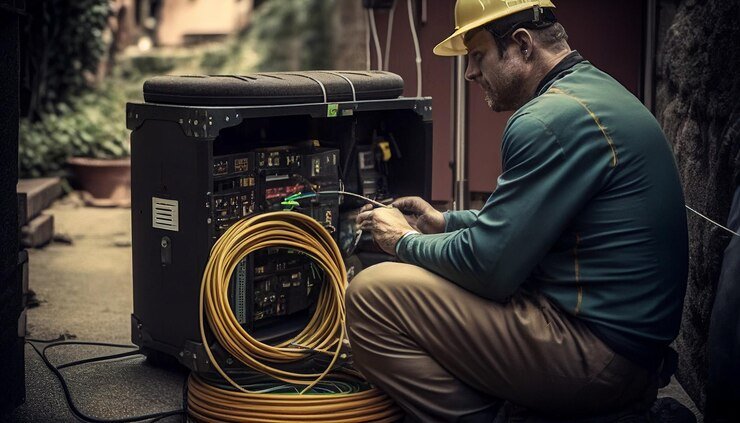Introduction Understanding the Impact of Generator Noise
Generators are essential for providing power in situations where electricity isn’t readily available. While they offer undeniable convenience, the incessant hum of a generator can become a major disturbance, impacting not just your peace but also your relationships with neighbors. In this article, we’ll explore effective strategies on how to reduce generator noise while maintaining functionality, ensuring that your generator serves as a helpful companion rather than an unwelcome intruder. By the end of this guide, you’ll be equipped with practical knowledge to create a quieter, more harmonious environment.
Why Reducing Generator Noise Matters
The noise generated by a typical generator can exceed 70 decibels, similar to the sound of a vacuum cleaner. This level of noise can disrupt sleep, interfere with conversations, and contribute to stress, particularly in residential areas. Reducing generator noise is crucial not only for personal comfort but also for maintaining cordial relations with neighbors. Excessive noise can lead to complaints and even legal action in areas with strict noise regulations. Additionally, consistently high noise levels can cause hearing damage over time, making it essential to address this issue for health reasons.
Quieter generators enhance the overall experience whether you’re camping, working outdoors, or simply using a backup power source at home. When you minimize noise, you create an environment where people can relax and enjoy their activities without constant disruption. Furthermore, reducing noise pollution aligns with broader environmental considerations, helping to create a more sustainable and responsible approach to power generation.
Steps to Physically Reduce Generator Noise
Upgrading to a Quieter Generator Model
One of the most straightforward ways to reduce generator noise is by upgrading to a quieter model. Modern generators are designed with noise reduction in mind, utilizing advanced technologies like inverter systems and improved mufflers. Investing in a newer model may seem costly upfront, but the long-term benefits of reduced noise pollution and increased efficiency are worth it. Inverter generators, for example, are known for their quiet operation and ability to adjust power output based on demand, making them an ideal choice for noise-sensitive areas.
When selecting a new generator, pay attention to the decibel rating provided by the manufacturer. Lower decibel ratings indicate quieter operation, so aim for a model that operates below 60 decibels if possible. Additionally, consider the size of the generator relative to your power needs; overloading a smaller generator can cause it to work harder and produce more noise. Choosing the right size ensures efficient operation and minimizes unnecessary noise.
Installing a Soundproof Enclosure or Barrier
If upgrading your generator isn’t an option, building or purchasing a soundproof enclosure can significantly dampen noise levels. These enclosures are designed to absorb and deflect sound waves, reducing the amount of noise that escapes into the surrounding environment. You can find commercial soundproof boxes or construct one yourself using materials like sound-deadening foam, mass-loaded vinyl, and heavy-duty acoustic panels.
When installing an enclosure, ensure there’s adequate ventilation to prevent overheating. The enclosure should allow for proper airflow while still containing noise. Additionally, consider adding weather-resistant seals around any openings to further minimize noise leakage. When done correctly, a soundproof enclosure can reduce generator noise by up to 10 decibels, making it a highly effective solution.
Placement and Distance from Noise-Sensitive Areas
The location of your generator can greatly influence noise levels. When possible, place the generator as far away as practical from noise-sensitive areas such as bedrooms, living spaces, or neighboring properties. The greater the distance, the more the noise dissipates before reaching sensitive areas. If relocating the generator isn’t feasible, consider adding barriers like walls or fences to deflect sound away from occupied spaces.
Additionally, placing the generator on a soft surface, such as grass or gravel, can help absorb vibrations that contribute to noise. Avoid placing the generator on hard surfaces like concrete, which can amplify sound. Strategic placement can effectively reduce the perceived noise, creating a more peaceful environment.
Regular Maintenance to Keep Noise Levels Low
Regular maintenance is essential for keeping your generator operating quietly and efficiently. Over time, components like mufflers, exhausts, and engine parts can wear down, leading to increased noise levels. By adhering to a routine maintenance schedule, you can identify and address potential issues before they escalate into significant problems.
Tasks like cleaning or replacing air filters, inspecting and tightening bolts, and checking for fuel leaks can all contribute to smoother, quieter operation. Additionally, ensure that any worn-out parts are promptly replaced with compatible components to maintain optimal performance. A well-maintained generator not only operates more quietly but also lasts longer, providing reliable power when you need it most.

Utilizing Technology to Minimize Generator Noise
Introduction to Inverter Generators
Inverter generators represent an evolution in generator technology, offering a quieter and more efficient alternative to traditional models. Unlike conventional generators, inverter generators produce AC power, convert it to DC, and then invert it back to clean AC power. This process results in reduced noise levels, as the generator can adjust its engine speed based on the power demand, operating at lower RPMs when full power isn’t required.
Inverter generators are particularly beneficial for powering sensitive electronics, as they provide a stable and clean power output. Their quiet operation makes them ideal for use in residential areas, camping trips, and outdoor events. While they may come with a higher price tag initially, the long-term benefits of reduced noise and increased efficiency make them a worthwhile investment.
Use of Anti-Vibration Mats and Dampeners
In addition to soundproof enclosures, anti-vibration mats and dampeners can further reduce noise generated by your generator. These materials are designed to absorb vibrations that contribute to noise, minimizing the transfer of sound to the surrounding environment. Place anti-vibration mats under your generator or install dampeners on the generator’s feet to achieve a noticeable reduction in noise levels.
These accessories are relatively inexpensive and easy to install, making them an accessible solution for anyone looking to reduce generator noise. By combining these tools with other noise-reduction strategies, you can create a remarkably quieter generator setup that doesn’t compromise on power or efficiency.
Smart Operation and Load Management
Implementing smart operation practices can also contribute to reduced noise levels. Load management involves distributing power usage across different devices to prevent overloading the generator, which can cause it to work harder and generate more noise. By staggering power consumption and only running essential devices at any given time, you can ensure that your generator operates smoothly and quietly.
Smart operation also extends to monitoring the generator’s performance using digital interfaces or apps. These tools can provide real-time data on power consumption, fuel levels, and maintenance needs, enabling you to make informed decisions about generator use. With smart operation, you can optimize your generator’s performance while minimizing noise and maximizing efficiency.
Environmental Considerations and Legalities
Noise Pollution Regulations and Compliance
When using a generator, it’s essential to be aware of noise pollution regulations in your area. Many municipalities have specific noise ordinances that limit the allowable decibel levels for generators, particularly in residential zones. Non-compliance with these regulations can result in fines, legal action, or restrictions on generator use.
To avoid potential legal issues, research local noise regulations and ensure that your generator setup aligns with these guidelines. If necessary, consult with local authorities or environmental agencies for clarification on permissible noise levels. By complying with noise regulations, you demonstrate responsible generator use and contribute to a quieter community.
Environmental Impact of Generator Usage
Beyond noise, generators have a broader environmental impact that should be considered. Traditional fuel-powered generators emit greenhouse gases and contribute to air pollution, affecting both human health and the environment. To mitigate this impact, explore alternative fuel options such as propane or natural gas, which burn cleaner than gasoline or diesel.
Additionally, consider investing in solar-powered generators or hybrid models that combine renewable energy with traditional fuel sources. These options can significantly reduce emissions while providing reliable power. By prioritizing environmentally friendly generator options, you contribute to a more sustainable future and minimize your ecological footprint.
Tips for Quieter Generator Operation
Time and Duration of Use
When operating a generator, consider the timing and duration of use to minimize noise disruption. Avoid running the generator during late-night or early-morning hours when ambient noise levels are lower, and disturbances are more noticeable. Limit use to essential tasks and avoid unnecessarily prolonged operation.
Planning generator use during daytime hours can help prevent conflicts with neighbors and reduce the impact of noise. By being mindful of when and how long you run your generator, you can balance convenience with consideration for others.
Informing Neighbors and Mitigating Discomfort
Open communication with your neighbors can go a long way in mitigating discomfort caused by generator noise. Inform them in advance of planned generator use, particularly if it will be frequent or prolonged. By providing a heads-up, you allow neighbors to plan accordingly and avoid potential conflict.
Additionally, consider offering solutions to mitigate discomfort, such as adjusting placement, limiting use to specific times, or inviting neighbors to provide feedback on noise levels. By demonstrating consideration and willingness to address concerns, you can maintain positive relationships within your community.
Importance of Proper Storage and Transport
Proper storage and transport of your generator can also impact noise levels. When not in use, store your generator in a secure, dry location to prevent damage and ensure optimal performance. Regularly inspect the storage area for potential hazards or obstructions that could contribute to noise during operation.
When transporting your generator, secure it properly to prevent excessive movement and vibration. Use appropriate vehicles or trailers designed to accommodate the generator’s weight and size. Proper handling during storage and transport helps preserve the generator’s integrity and ensures quieter operation over time.
Conclusion A Balance of Comfort, Convenience, and Consideration
Reducing generator noise is a multifaceted challenge that requires a combination of physical modifications, technological advancements, and mindful operation. By implementing the strategies outlined in this guide, you can create a quieter generator setup that enhances comfort and convenience without compromising on power or efficiency.



